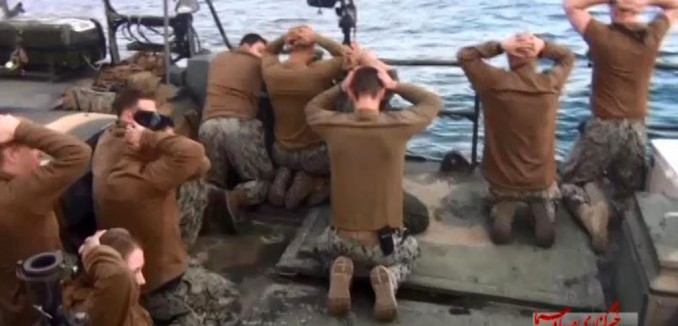The United States military said that the 10 American sailors who were seized along with their two boats by Iran last week were held at gunpoint, Reuters reported on Monday.
According to a statement released by the United States Central Command (CENTCOM), which is the fullest account of the incident to date, the sailors were taken at gunpoint to a port facility on Farsi Island, where they were detained for around 15 hours. The Iranians were also revealed to have confiscated SIM cards from two satellite phones that the sailors had in their possession.
The news comes in the wake of charges that Iran’s actions during the seizure of the American vessels and their crews, who U.S. authorities say wandered into Iranian waters due to a mechanical failure, violated international law.
The Wall Street Journal reported last week that “under international maritime law, such innocent passage’ should have brought an instruction to leave those waters, not a seizure and detention, according to Navy manuals citing the international standards.”
Similarly, former naval officer Sen. John McCain (R – Ariz.), currently the Chairman of the Senate Armed Services Committee, released a statement last week asserting, “Under international law, sovereign immune vessels like navy ships and boats do not lose their sovereign immune status when they are in distress at sea. Under international law, sovereign immune naval vessels are exempt from detention, boarding, or search. Their crews are not subject to detention or arrest.” McCain was held as a prisoner of war during the Vietnam War.
In addition, heavily-broadcast pictures of the detained sailors that were taken while they were kneeling with their hands behind their heads may have violated the Third Geneva Convention, which is supposed to protect prisoners “against acts of violence or intimidation and against insults and public curiosity.”
Bill Luti, vice president of Hudson Institute, said on Friday, “it appears the seizure by the Iranians violates several, if two or three, well-established principles of international and maritime law. The first one being, of course, being innocent passage, where ships of all states, whether coastal or landlocked, have the right of innocent passage through territorial waters… sovereign immunity of warships… third principle, while we’re not technically at war with Iran, the 1949 Geneva Conventions and the Protocol 1 and 2 of 1977, which clearly prohibit the filming, photographing or otherwise using videotaped or audio-taped confessions or apologies for propaganda purposes.”
A similar case was made after Iran captured 15 British sailors and marines in 2007, when the British government asserted that the broadcasting of their images breached the Third Geneva Convention.
American lawmakers have also voiced concern over Iran’s treatment of the sailors, with Rep. Mike Pompeo (R – Kans.) calling for an investigation into whether Iran’s actions violated the convention.
I am relieved to hear that the ten U.S. Navy sailors that Iran captured have been returned. We are thankful for the service and bravery of these nine men and one woman. We now must fully investigate Iran for possible violations of the Geneva Convention and ensure these sailors were treated properly.
“Iran’s capture of these sailors raises serious questions about the Iranian regime and what it will take for the Obama administration to understand that Iran is not a partner in peace. How many American service members does Iran would have to capture? How many U.N. resolutions does Iran have to violate? And how close do Iranian rockets have to come to U.S. ships before President Obama takes real action against Iran? Is there any limit to what the fanatical Iranian regime can get away with?
Iran seized the Marshall Islands-flagged cargo ship Maersk Tigris last year, holding its crew for ten days until the company that owned the vessel agreed to pay a judgment issued by an Iranian court. Legal scholar Eugene Kontorovich wrote in The Washington Post that the seizure “clearly [violated] international law, and one might add, a branch of international law that is ordinarily well-respected, and quite fundamental for global commerce.”
[Photo: Amichei Stein / Twitter]




